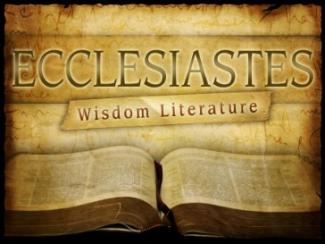
Ecclesiastes
Our second peek at ancient texts that discuss economic life is from the book of Ecclesiastes. Ecclesiastes is believed to have been written by King Solomon around the third century B.C.E. The word Ecclesiastes means Teacher, and refers to Solomon. You may recall that he was considered one of the wisest men who ever lived. (Remember the story of him deciding to tear the baby in half?)
The third section of Ecclesiastes says, in part,
What profit hath a man of all his labor?
Wherein (Why does) he laboreth under the sun?
One generation passeth away, and another generation cometh;
And the earth abideth for ever…
As he came forth of his mother’s womb, naked shall he go back as he came, and shall take nothing for his labor…
This says to me that man works his whole life, and after a whole life of toil, takes none of his life’s work with him. So, work a lifetime, and the physical fruits of that work (wealth in any form), is of no value at life’s end. Those fruits may pass to your next generation, but the man enjoys it not.
There’s a bumper sticker that was popular a few years ago, and I still see every now and then. It says “He who dies with the most toys wins.” It always struck me as a silly sentiment, and I think Solomon the Wise would have said so too. Elsewhere in Ecclesiastes, Solomon says:
Vanity of vanities, all is vanity
According to dictionary.com vanity is:
Excessive pride in one's appearance, qualities, abilities, achievements, etc.; character or quality of being vain; conceit.
To me, this speaks to blindness to the rest of the world. Focusing on one’s own wealth combined with blindness to the rest of the world, its values, its beauty, and its pleasures inhibits one from enjoying one’s own life to the extent possible. Remember what you will be taking with you when you leave this world (wherever you think you’re going to).
Therefore, put balance in your life. At BCR Wealth our tagline is “Your Life in Balance” because we believe that accumulation of wealth, with no plan or activity to enjoy life itself, wastes a good deal of that which life has to offer. And, we think King Solomon would have agreed.
-Harold Sasnowitz-

